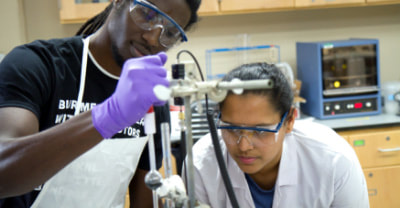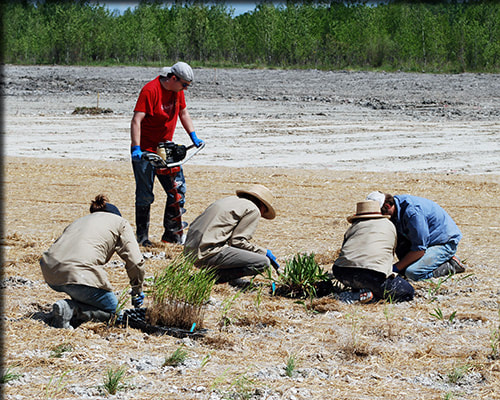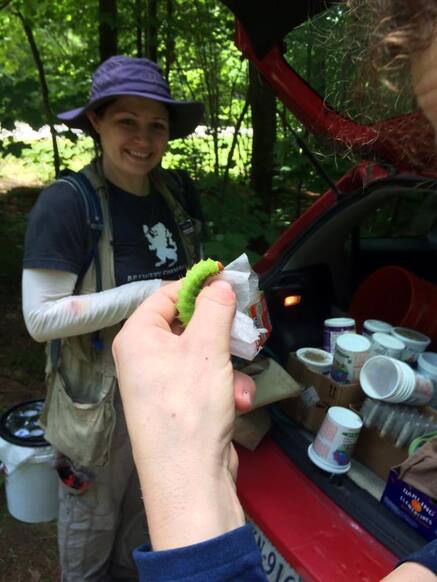Graduate Research Mentors for Spring 2024
You can view all available graduate mentors for Spring 2024 by department below.
This list is updated as opportunities arise.
This list is updated as opportunities arise.
Environmental Biology (EB)
Joanna Lumbsden-Pinto
Email: [email protected]
Program: Phd - Environmental Science (Ecosystem restoration (Ecosystems: Land, Water and Air)
Advisor: Martin Dovciak
Research Project Description: My research field is in the Long Island Central Pine Barrens (LICPB), which is a fire-adapted forest that serves as a sponge to sustain, filter, and purify the drinking water underneath Long Island. The LICPB faces numerous challenges, such as changing climate and increased tree mortality caused by fire suppression and invasive species (i.e., southern pine beetle). My research aims to characterize the health of this forest in view of these challenges. First, by resurveying and establishing permanent vegetation plots to quantify changes in forest structure and analyze how forests changed over time as a function of their past fire history. Second, I am studying microclimate patterns across the LICPB to better understand the effects of forest structure on forest temperature and its potential to affect the fire regime and forest regeneration. The main contributions of this research will be to determine ongoing compositional changes in forest plant communities due to tree mortality and changes in tree species regeneration and their recruitment into the canopy--all critical aspects for understanding the ongoing and potential future ecosystem trajectories. Additionally, this research will make available critical information on microclimate dynamics concerning forest structure in the LICPB, providing a better understanding of the fire regime. The findings of this research would likewise guide conservation, restoration, management, and planning strategies to maintain fire- and climate-sensitive LICPB ecosystems under changing environmental conditions.
Website: https://www.esf.edu//biology/dovciak/People.php
Email: [email protected]
Program: Phd - Environmental Science (Ecosystem restoration (Ecosystems: Land, Water and Air)
Advisor: Martin Dovciak
Research Project Description: My research field is in the Long Island Central Pine Barrens (LICPB), which is a fire-adapted forest that serves as a sponge to sustain, filter, and purify the drinking water underneath Long Island. The LICPB faces numerous challenges, such as changing climate and increased tree mortality caused by fire suppression and invasive species (i.e., southern pine beetle). My research aims to characterize the health of this forest in view of these challenges. First, by resurveying and establishing permanent vegetation plots to quantify changes in forest structure and analyze how forests changed over time as a function of their past fire history. Second, I am studying microclimate patterns across the LICPB to better understand the effects of forest structure on forest temperature and its potential to affect the fire regime and forest regeneration. The main contributions of this research will be to determine ongoing compositional changes in forest plant communities due to tree mortality and changes in tree species regeneration and their recruitment into the canopy--all critical aspects for understanding the ongoing and potential future ecosystem trajectories. Additionally, this research will make available critical information on microclimate dynamics concerning forest structure in the LICPB, providing a better understanding of the fire regime. The findings of this research would likewise guide conservation, restoration, management, and planning strategies to maintain fire- and climate-sensitive LICPB ecosystems under changing environmental conditions.
Website: https://www.esf.edu//biology/dovciak/People.php
Chemistry (FCH)
Liz McDaniel
Email: [email protected]Program: PhD - Chemistry
Advisor: Dr. Mark Driscoll
Research Project Description: Currently I’m working on looking at the differences in solubility of different types of cellulose using different concentrations of NaOH and different temperatures.
Makayla Light
Email: [email protected]
Program: PhD - Chemistry
Advisor: Nicholas Pflug
Research Project Description: Semiochemicals are a hot topic of study amongst entomologists and chemical ecologists alike, but more important to determining what compounds are attractive to insects is how to make them. My research centers around determining what compounds are attractants to insects, many of which are invasive species, as well as isolating and confirming their structures, and subsequently synthesizing them in the lab using various organic synthesis techniques.
Name: Ramachandra Legundapati
Email: [email protected]
Program: Phd - Chemistry
Advisor: Gyu Leem
Research Project Description: My research is focused on sensing of PFAS and degradation of pollutants in Dissolved organic matter in water systems, by means of photoelectrocatalysis.
Website: https://leemlab.org/
Name: Gianna Leippert
Email: [email protected]
Program: MS - Chemistry
Advisor: Nicholas Pflug, Lee Newman
Research Project Description: "Per- and polyfluoroalkyl substances (PFAS) are a class of recalcitrant, bio-accumulative organic compounds that occur globally as contaminants in soil, water, air, and biological matrices. The bio-accumulative characteristic of PFAS have raised concerns regarding human exposure to PFAS through ingestion of PFAS-containing foods. PFAS have been detected in both plant and animal food products. Bioaccumulation may occur in food webs within reforested contamination sites. For people who regularly consume wild plants, fungi, and/or game, this may be an important exposure pathway. In this study, I am analyzing wild plants and fungi that are eaten by game animals and/or humans for their PFAS content in edible portions (i.e. fruits, leaves).
Email: [email protected]Program: PhD - Chemistry
Advisor: Dr. Mark Driscoll
Research Project Description: Currently I’m working on looking at the differences in solubility of different types of cellulose using different concentrations of NaOH and different temperatures.
Makayla Light
Email: [email protected]
Program: PhD - Chemistry
Advisor: Nicholas Pflug
Research Project Description: Semiochemicals are a hot topic of study amongst entomologists and chemical ecologists alike, but more important to determining what compounds are attractive to insects is how to make them. My research centers around determining what compounds are attractants to insects, many of which are invasive species, as well as isolating and confirming their structures, and subsequently synthesizing them in the lab using various organic synthesis techniques.
Name: Ramachandra Legundapati
Email: [email protected]
Program: Phd - Chemistry
Advisor: Gyu Leem
Research Project Description: My research is focused on sensing of PFAS and degradation of pollutants in Dissolved organic matter in water systems, by means of photoelectrocatalysis.
Website: https://leemlab.org/
Name: Gianna Leippert
Email: [email protected]
Program: MS - Chemistry
Advisor: Nicholas Pflug, Lee Newman
Research Project Description: "Per- and polyfluoroalkyl substances (PFAS) are a class of recalcitrant, bio-accumulative organic compounds that occur globally as contaminants in soil, water, air, and biological matrices. The bio-accumulative characteristic of PFAS have raised concerns regarding human exposure to PFAS through ingestion of PFAS-containing foods. PFAS have been detected in both plant and animal food products. Bioaccumulation may occur in food webs within reforested contamination sites. For people who regularly consume wild plants, fungi, and/or game, this may be an important exposure pathway. In this study, I am analyzing wild plants and fungi that are eaten by game animals and/or humans for their PFAS content in edible portions (i.e. fruits, leaves).
Environmental Science (GPES)
Joanna Lumbsden-Pinto
Email: [email protected]
Program: Phd - Environmental Science (Ecosystem restoration (Ecosystems: Land, Water and Air)
Advisor: Martin Dovciak
Research Project Description: My research field is in the Long Island Central Pine Barrens (LICPB), which is a fire-adapted forest that serves as a sponge to sustain, filter, and purify the drinking water underneath Long Island. The LICPB faces numerous challenges, such as changing climate and increased tree mortality caused by fire suppression and invasive species (i.e., southern pine beetle). My research aims to characterize the health of this forest in view of these challenges. First, by resurveying and establishing permanent vegetation plots to quantify changes in forest structure and analyze how forests changed over time as a function of their past fire history. Second, I am studying microclimate patterns across the LICPB to better understand the effects of forest structure on forest temperature and its potential to affect the fire regime and forest regeneration. The main contributions of this research will be to determine ongoing compositional changes in forest plant communities due to tree mortality and changes in tree species regeneration and their recruitment into the canopy--all critical aspects for understanding the ongoing and potential future ecosystem trajectories. Additionally, this research will make available critical information on microclimate dynamics concerning forest structure in the LICPB, providing a better understanding of the fire regime. The findings of this research would likewise guide conservation, restoration, management, and planning strategies to maintain fire- and climate-sensitive LICPB ecosystems under changing environmental conditions.
Website: https://www.esf.edu//biology/dovciak/People.php
Email: [email protected]
Program: Phd - Environmental Science (Ecosystem restoration (Ecosystems: Land, Water and Air)
Advisor: Martin Dovciak
Research Project Description: My research field is in the Long Island Central Pine Barrens (LICPB), which is a fire-adapted forest that serves as a sponge to sustain, filter, and purify the drinking water underneath Long Island. The LICPB faces numerous challenges, such as changing climate and increased tree mortality caused by fire suppression and invasive species (i.e., southern pine beetle). My research aims to characterize the health of this forest in view of these challenges. First, by resurveying and establishing permanent vegetation plots to quantify changes in forest structure and analyze how forests changed over time as a function of their past fire history. Second, I am studying microclimate patterns across the LICPB to better understand the effects of forest structure on forest temperature and its potential to affect the fire regime and forest regeneration. The main contributions of this research will be to determine ongoing compositional changes in forest plant communities due to tree mortality and changes in tree species regeneration and their recruitment into the canopy--all critical aspects for understanding the ongoing and potential future ecosystem trajectories. Additionally, this research will make available critical information on microclimate dynamics concerning forest structure in the LICPB, providing a better understanding of the fire regime. The findings of this research would likewise guide conservation, restoration, management, and planning strategies to maintain fire- and climate-sensitive LICPB ecosystems under changing environmental conditions.
Website: https://www.esf.edu//biology/dovciak/People.php
Sustainanle Resource Management (SRM)
Sara Dreibelbis
Email: [email protected]
Program: MS - SRM
Advisor: Dr. Rene Germain, Dr. Steven Stehman, Dr. Bill Smith
Research Project Description: Using an individual log-based sawmill study to identify stem and log characteristics of eastern white pine trees that can help foresters and mills make smart harvest decisions to improve lumber grade recovery and mill profitability and viability. Field work was done in summer 2023 working with a white pine mill in the Adirondacks; we collected data on study stems in the woods, at the log yard, and then tracked each log through the mill to collect data on resulting board volume and grade. Now, we're analyzing that data to try to identify connections that can contribute to both silvicultural management for high quality white pine and forester decision-making for white pine harvests.
Eva Legge
Email: [email protected]
Program: MS - Sustainable Resources Management (SRM)
Advisor: Dr. Andrew Vander Yacht
Research Project Description: My research investigates the effects of various forest management practices (such as timber harvest and prescribed fire) on seedling-mycorrhizal relationships. My aim is to determine what silvicultural practices may be used to best optimize mycorrhizal-derived benefits to seedlings. To do so, I will be planting seedling under different forest management types, and in different legacies of mycorrhizal associations. In addition, I will be conducting a greenhouse experiment investigating the mycorrhizal drivers of forest "mesophication": the continual reinforcement of shade-tolerant, moisture-loving, and fire-sensitive species like maples (Acer spp.) that outcompete disturbance-adapted oaks.
Website: https://www.evalegge.com/
Name: Seyedeh Niloufar Mousavi
Email: [email protected]
Program: PhD - Sustainable resource management
Advisor: Dr. Tristan Brown Research Project Description: During my Masters, my research was about building energy efficiency, net-zero buildings, and renewable supply. At ESF my research is about bio-plastic in building application and its techno-economic impacts.
Email: [email protected]
Program: MS - SRM
Advisor: Dr. Rene Germain, Dr. Steven Stehman, Dr. Bill Smith
Research Project Description: Using an individual log-based sawmill study to identify stem and log characteristics of eastern white pine trees that can help foresters and mills make smart harvest decisions to improve lumber grade recovery and mill profitability and viability. Field work was done in summer 2023 working with a white pine mill in the Adirondacks; we collected data on study stems in the woods, at the log yard, and then tracked each log through the mill to collect data on resulting board volume and grade. Now, we're analyzing that data to try to identify connections that can contribute to both silvicultural management for high quality white pine and forester decision-making for white pine harvests.
Eva Legge
Email: [email protected]
Program: MS - Sustainable Resources Management (SRM)
Advisor: Dr. Andrew Vander Yacht
Research Project Description: My research investigates the effects of various forest management practices (such as timber harvest and prescribed fire) on seedling-mycorrhizal relationships. My aim is to determine what silvicultural practices may be used to best optimize mycorrhizal-derived benefits to seedlings. To do so, I will be planting seedling under different forest management types, and in different legacies of mycorrhizal associations. In addition, I will be conducting a greenhouse experiment investigating the mycorrhizal drivers of forest "mesophication": the continual reinforcement of shade-tolerant, moisture-loving, and fire-sensitive species like maples (Acer spp.) that outcompete disturbance-adapted oaks.
Website: https://www.evalegge.com/
Name: Seyedeh Niloufar Mousavi
Email: [email protected]
Program: PhD - Sustainable resource management
Advisor: Dr. Tristan Brown Research Project Description: During my Masters, my research was about building energy efficiency, net-zero buildings, and renewable supply. At ESF my research is about bio-plastic in building application and its techno-economic impacts.
- Background: The construction industry is a major contributor to greenhouse gas emissions and environmental pollution. The use of petroleum-based plastics in building construction is a major contributor to this problem. Bioplastics are a promising alternative to petroleum-based plastics, as they are made from renewable resources and are biodegradable.
- Project Objectives: Investigate the potential applications of bioplastics in building construction. Evaluate the technical and economic feasibility of using bioplastics in building construction. Develop recommendations for the use of bioplastics in building construction
- Project Scope. The project will focus on the following areas: Identification of bioplastics that are suitable for use in building construction Evaluation of the technical performance of bioplastics in building construction applications Techno-economic analysis of the use of bioplastics in building construction
- Project Methodology: The project will be conducted in three phases: Phase 1: Literature Review A comprehensive literature review will be conducted to identify bioplastics that are suitable for use in building construction and to evaluate their technical performance. Phase 2: Experimental Evaluation Experimental tests will be conducted to evaluate the technical performance of selected bioplastics in building construction applications. Phase 3: Techno-Economic Analysis A techno-economic analysis will be conducted to assess the economic feasibility of using bioplastics in building construction.
- Project Outcomes: The expected outcomes of this project are: A comprehensive database of bioplastics that are suitable for use in building construction. A report on the technical performance of bioplastics in building construction applications. A report on the techno-economic analysis of the use of bioplastics in building construction. Recommendations for the use of bioplastics in building construction.
Chemical Engineering
Landscape ARchitecture
Environmental Resources Engineering
Environmental Studies
Name: Asif Mehmood
Email: [email protected]
Program: PhD - Environmental Science/Environmental Studies
Advisor: Joshua J Cousins
Research Project Description: I focus on the Chinese Belt-and-Road-Initiative (BRI)’s Pakistani offshoot, the China-Pakistan Economic Corridor (CPEC). Informed by debates in infrastructure-nature and state formation domains, I proceed by underscoring infrastructure’s agential role in producing state(s). I follow the proposition from the BRI studies scholars who argue that with the BRI investments, export of the ‘China Model’ of development/‘Chinese Worldview’ to its partners in the developing world also took place. With this premise, I take CPEC as an imaginary of the ‘China Model’ and a site where this model is put to practice and ethnographically track state-society transactions within environmental resource governance at three sites – Sahiwal coal power generation unit, Tharparkar coalfield, and Multan-Sukkar Motorway. I explore what kind of state emerges in Pakistan from the ‘infrastructural thinking’ under the ‘China Model’ couched in environmental governance.
Emme Christie
Email: [email protected]
Program: PhD - Environmental Science/Environmental Studies
Advisor: Dr. Valerie Luzadis & Dr. Sharon Moran
Research Project Description: My primary research involves an inquiry into the formation of a national environmental identity through a mixed-methods survey of environmental history and present practices of environmental discourse and governance. Through this work, I hope to make an impact as a justice, equity, diversity, access, and inclusion (JEDAI) scholar by centering the voices of historically marginalized groups in environmental decision-making.
I currently have six on-going projects that can be viewed on my website (link provided). I'd be happy to engage students on any of those projects. Feel free to check out my website: https://emmechristie.wixsite.com/emmec2
Andrea Cass
Email: [email protected]
Program: PhD - Environmental Science/Environmental Studies
Advisor: Jamie Shinn; Joshua Cousins
Research Project Description: Communities across West Virginia (WV) have a high risk of flooding, with at least one flooding-related federal disaster declared in all 55 counties since 1996 (LULC 2022, WVDHS 2018). When floods occur, WV communities rely on a complex network of local, state, and federal agencies, non-profit organizations, and volunteers for immediate response and long-term recovery. As evidenced during the years since a major flood in 2016, this network is not sufficient for making a complete recovery (Shinn and Caretta 2020). Co-created by civic actors and academic researchers, our community engagement project assesses how WV residents have recovered from past floods and how prepared they are for future floods. In conjunction with the survey, flood risk indicator reports, in-depth flood risk visualization tools, floodplain management and flood insurance trainings, and a statewide symposium, will inform a West Virginia Flood Resilience Framework (WVFRF). The WVFRF will provide best practices for pre-disaster coordination of flood resilience and post-disaster recovery efforts.
Email: [email protected]
Program: PhD - Environmental Science/Environmental Studies
Advisor: Joshua J Cousins
Research Project Description: I focus on the Chinese Belt-and-Road-Initiative (BRI)’s Pakistani offshoot, the China-Pakistan Economic Corridor (CPEC). Informed by debates in infrastructure-nature and state formation domains, I proceed by underscoring infrastructure’s agential role in producing state(s). I follow the proposition from the BRI studies scholars who argue that with the BRI investments, export of the ‘China Model’ of development/‘Chinese Worldview’ to its partners in the developing world also took place. With this premise, I take CPEC as an imaginary of the ‘China Model’ and a site where this model is put to practice and ethnographically track state-society transactions within environmental resource governance at three sites – Sahiwal coal power generation unit, Tharparkar coalfield, and Multan-Sukkar Motorway. I explore what kind of state emerges in Pakistan from the ‘infrastructural thinking’ under the ‘China Model’ couched in environmental governance.
Emme Christie
Email: [email protected]
Program: PhD - Environmental Science/Environmental Studies
Advisor: Dr. Valerie Luzadis & Dr. Sharon Moran
Research Project Description: My primary research involves an inquiry into the formation of a national environmental identity through a mixed-methods survey of environmental history and present practices of environmental discourse and governance. Through this work, I hope to make an impact as a justice, equity, diversity, access, and inclusion (JEDAI) scholar by centering the voices of historically marginalized groups in environmental decision-making.
I currently have six on-going projects that can be viewed on my website (link provided). I'd be happy to engage students on any of those projects. Feel free to check out my website: https://emmechristie.wixsite.com/emmec2
Andrea Cass
Email: [email protected]
Program: PhD - Environmental Science/Environmental Studies
Advisor: Jamie Shinn; Joshua Cousins
Research Project Description: Communities across West Virginia (WV) have a high risk of flooding, with at least one flooding-related federal disaster declared in all 55 counties since 1996 (LULC 2022, WVDHS 2018). When floods occur, WV communities rely on a complex network of local, state, and federal agencies, non-profit organizations, and volunteers for immediate response and long-term recovery. As evidenced during the years since a major flood in 2016, this network is not sufficient for making a complete recovery (Shinn and Caretta 2020). Co-created by civic actors and academic researchers, our community engagement project assesses how WV residents have recovered from past floods and how prepared they are for future floods. In conjunction with the survey, flood risk indicator reports, in-depth flood risk visualization tools, floodplain management and flood insurance trainings, and a statewide symposium, will inform a West Virginia Flood Resilience Framework (WVFRF). The WVFRF will provide best practices for pre-disaster coordination of flood resilience and post-disaster recovery efforts.



